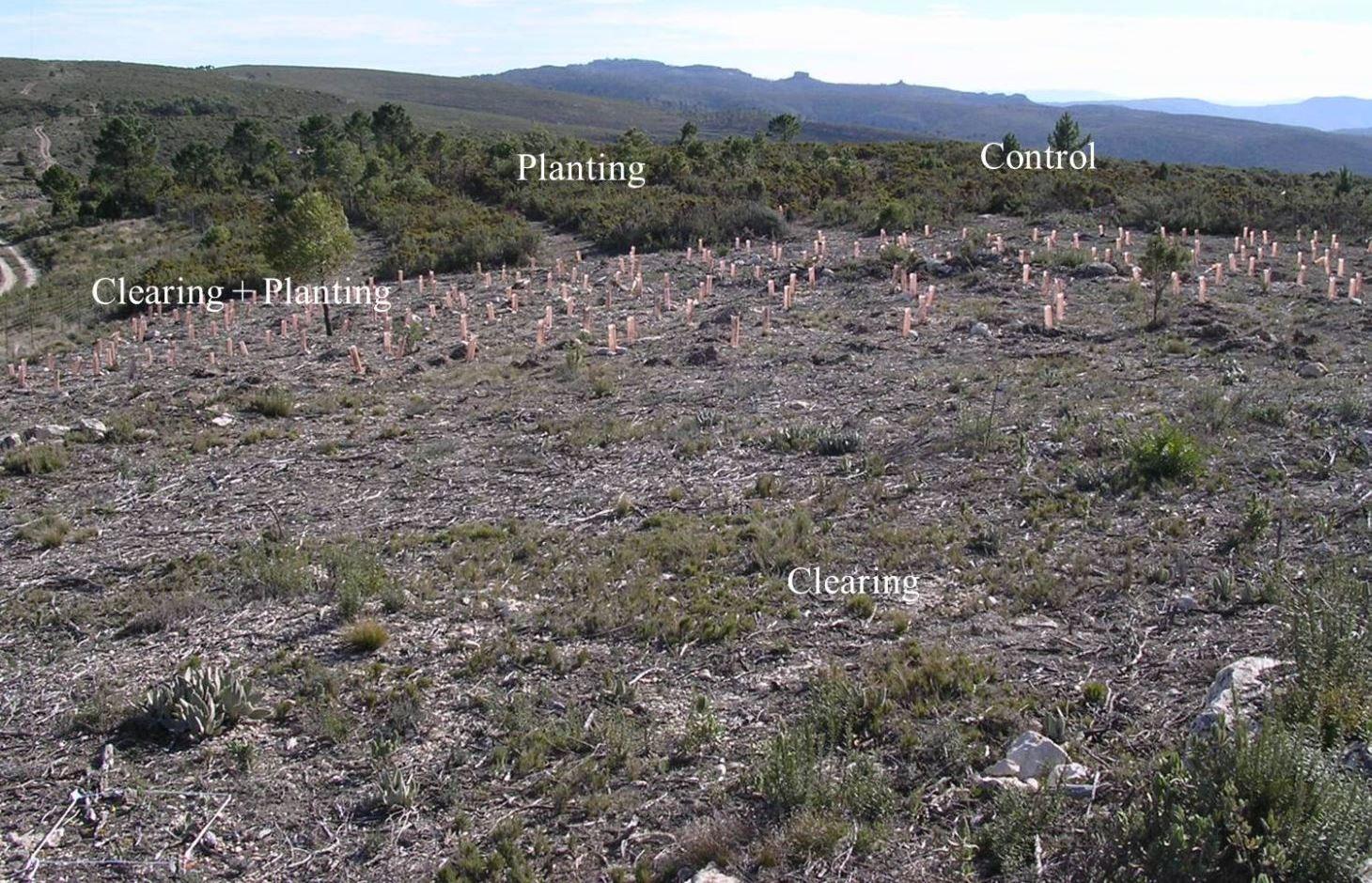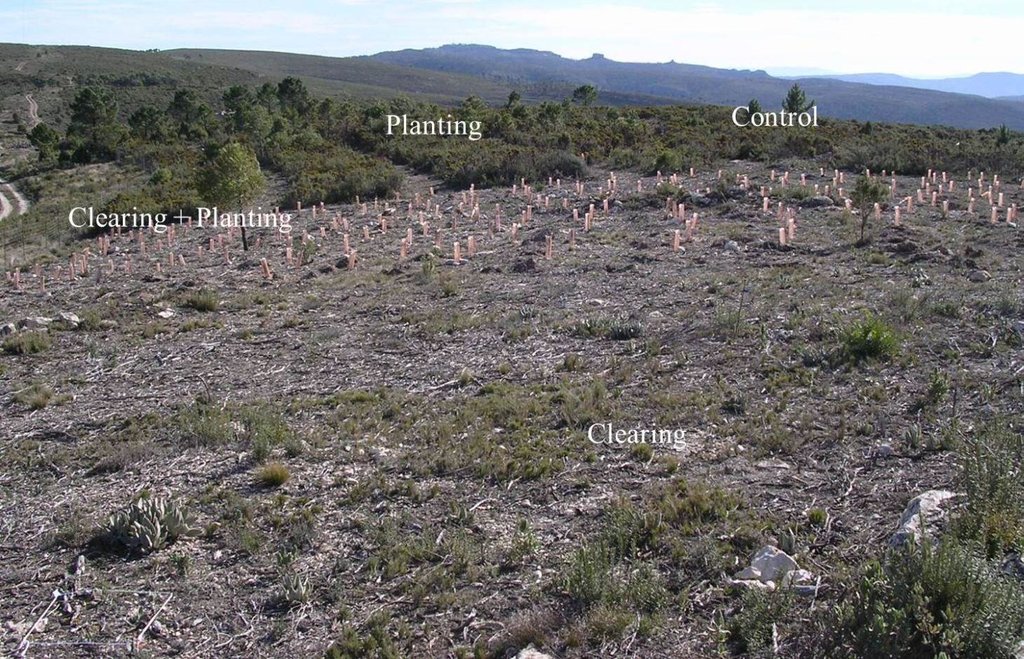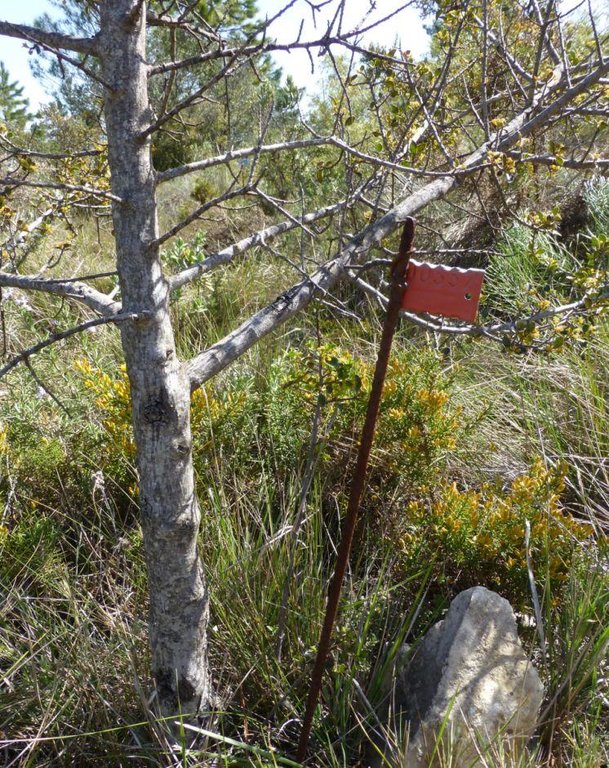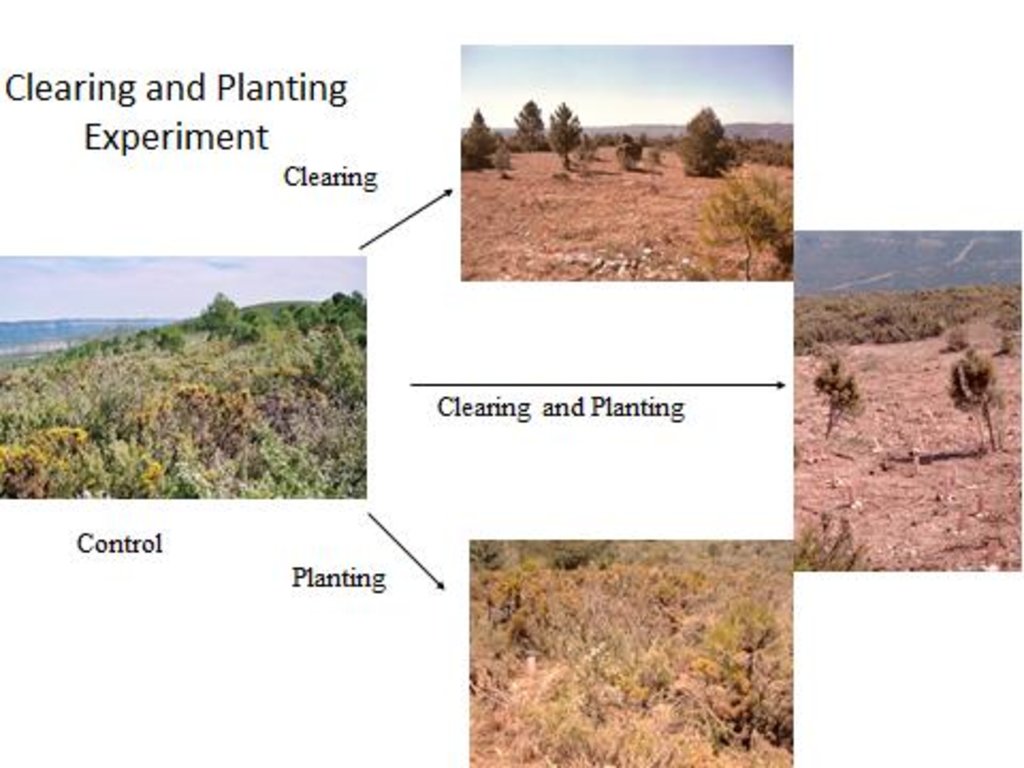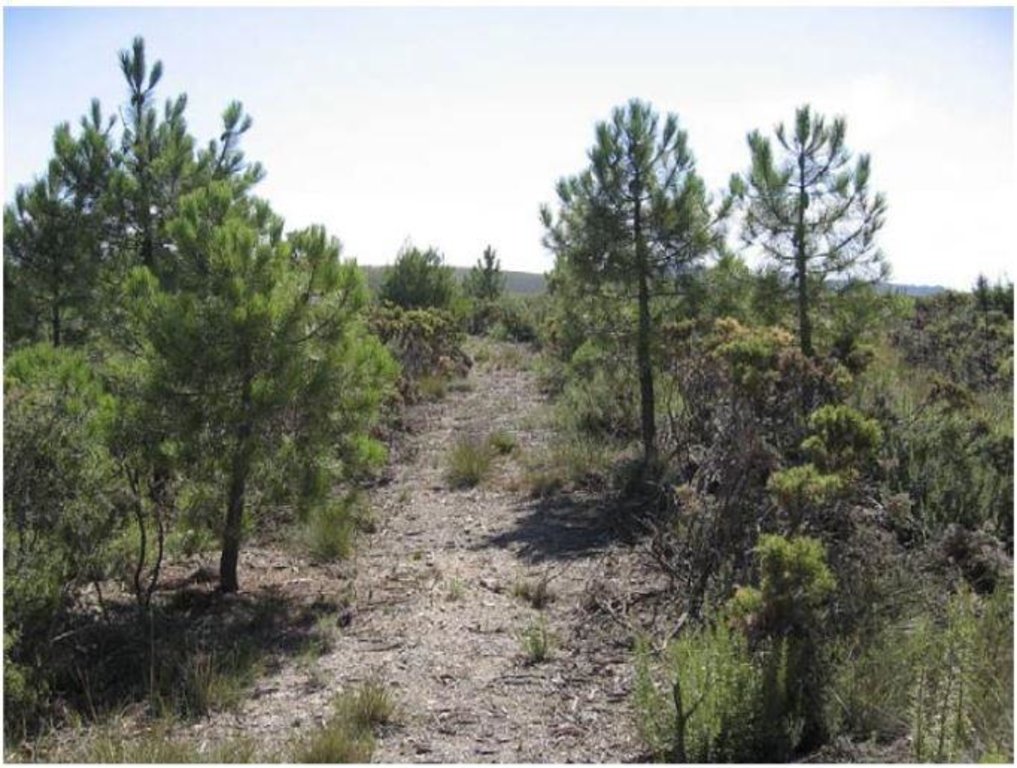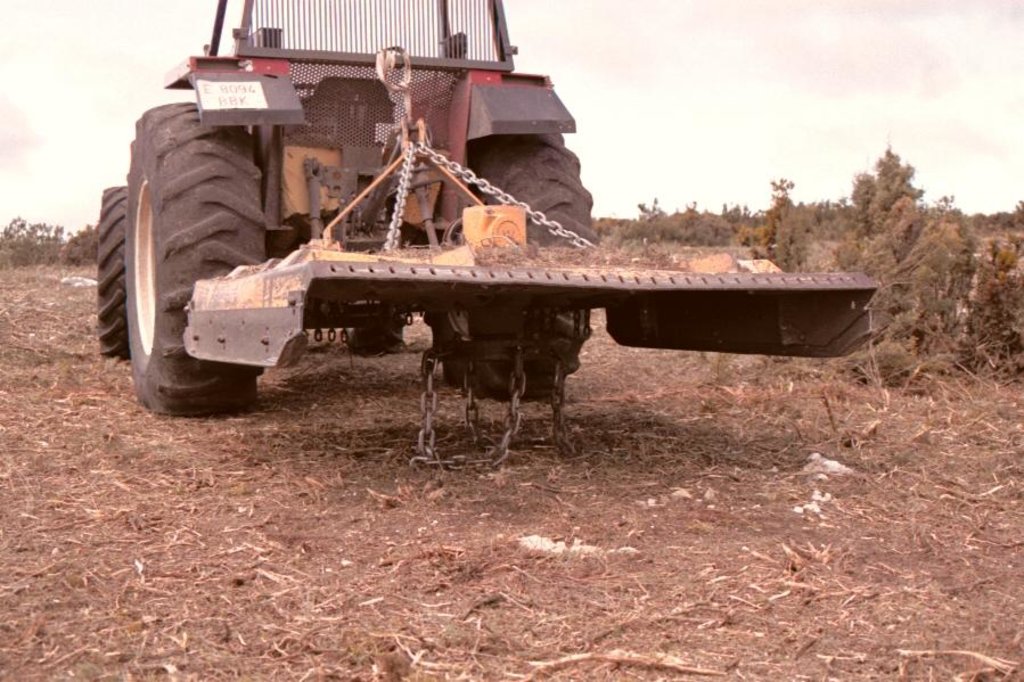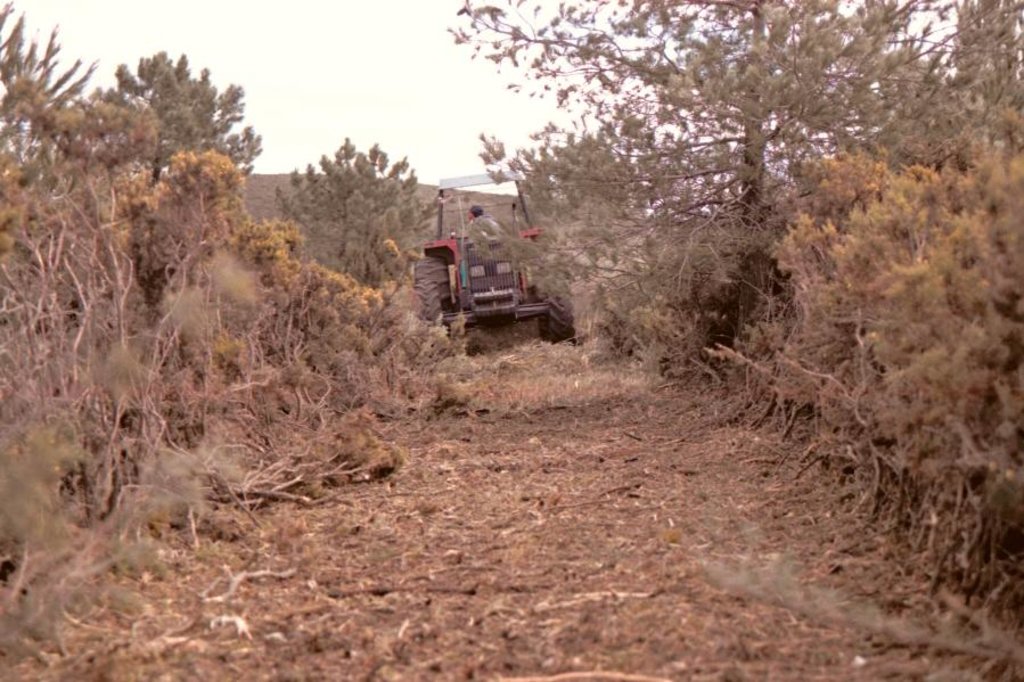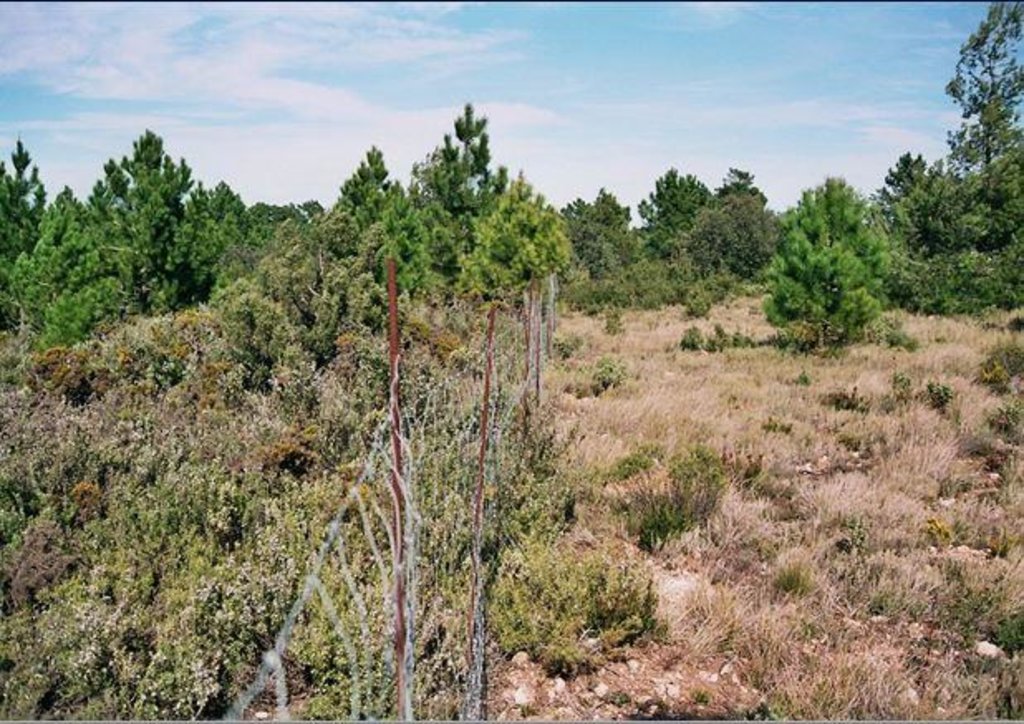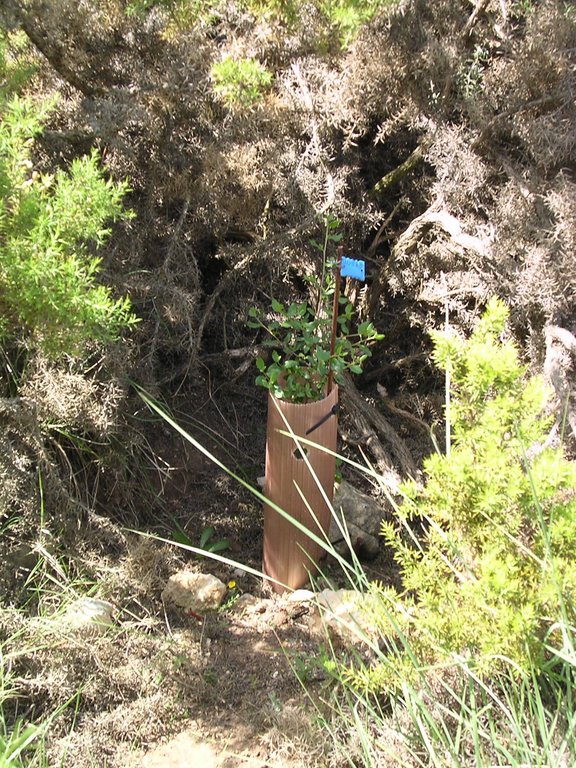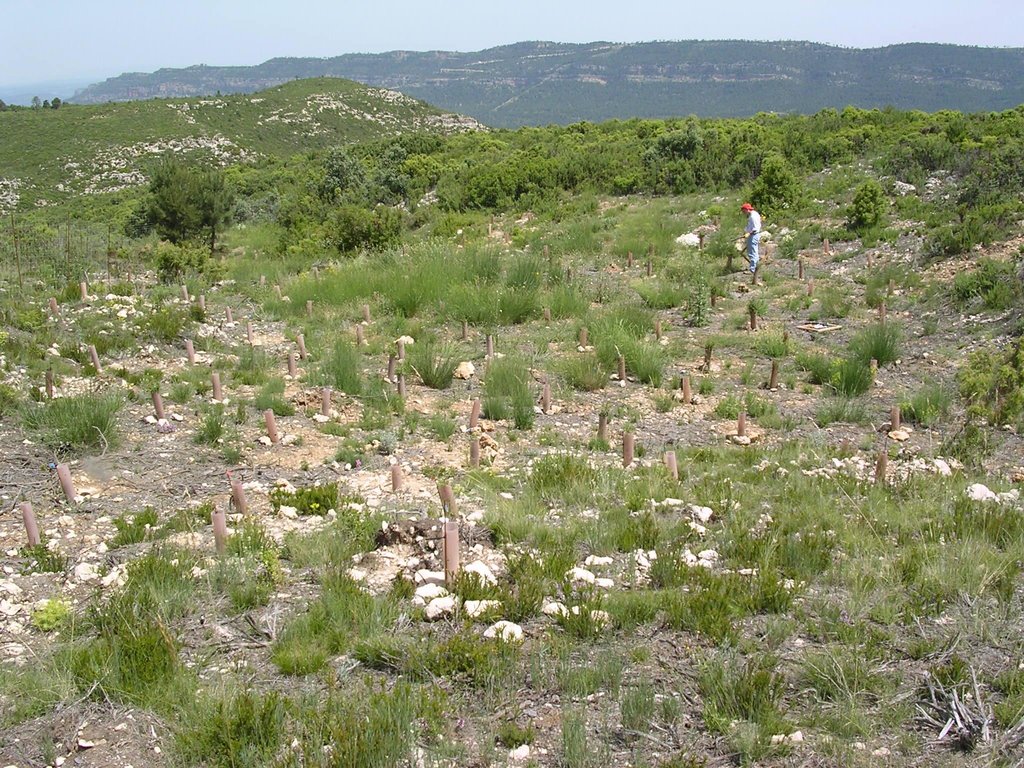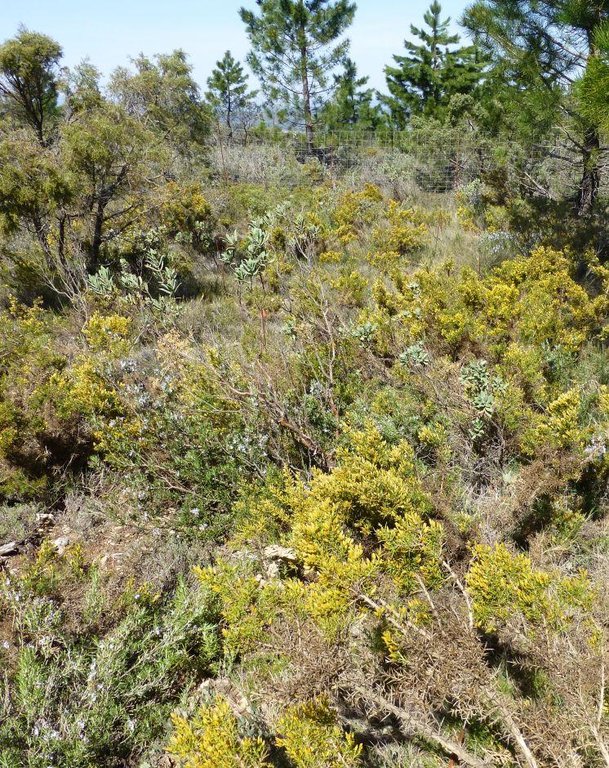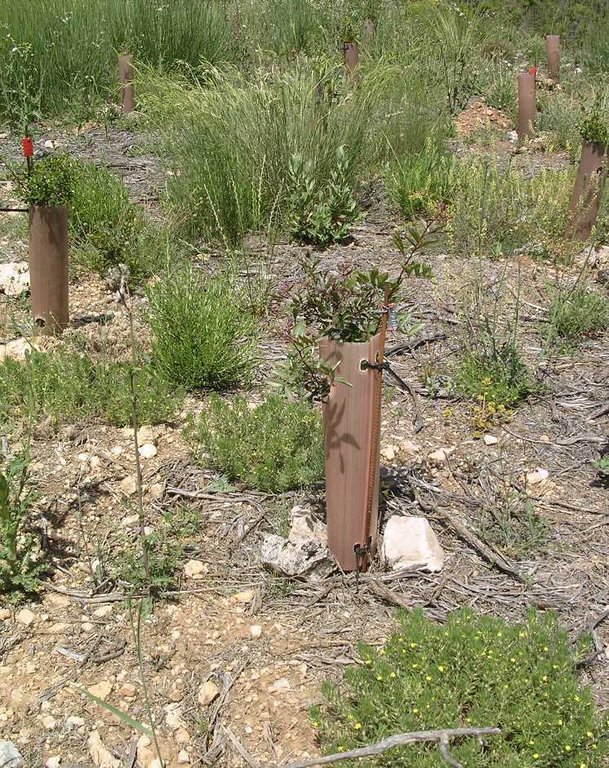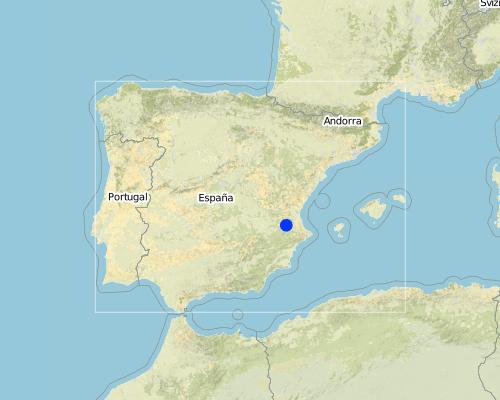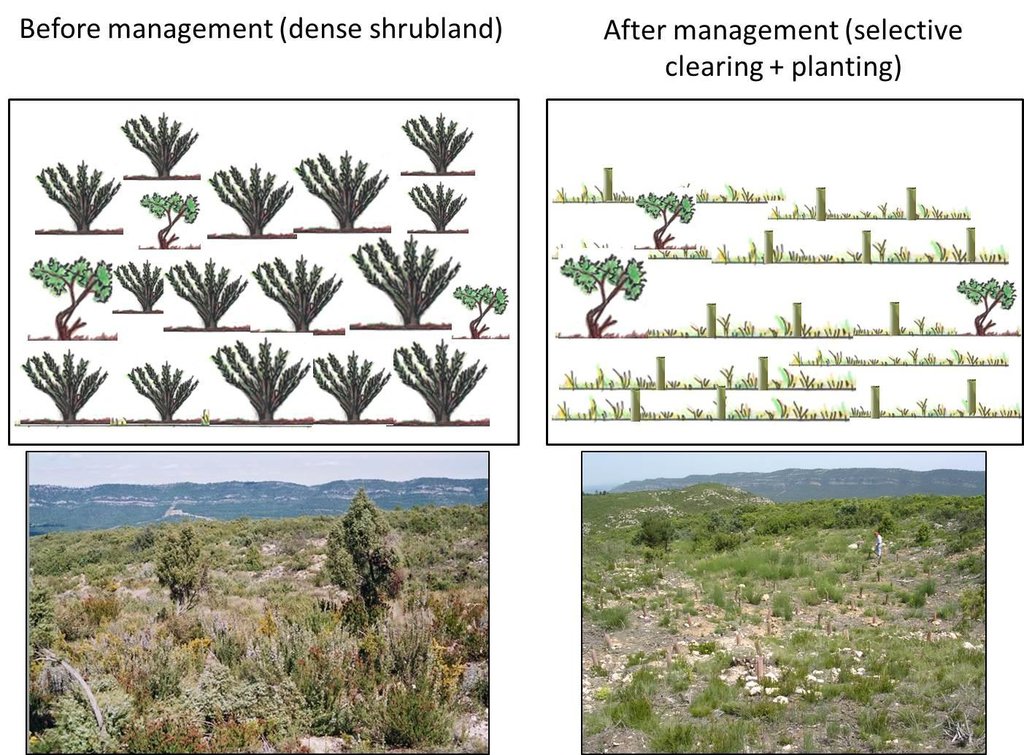Selective clearing and planting experiment to promote shrubland fire resilience [西班牙]
- 创建:
- 更新:
- 编制者: Nina Lauterburg
- 编辑者: –
- 审查者: Deborah Niggli
Experimento para aumentar la resiliencia del matorral contra incendios (Spanish)
technologies_1579 - 西班牙
- Selective clearing and planting experiment to promote shrubland fire resilience: Jan. 4, 2017 (inactive)
- Selective clearing and planting experiment to promote shrubland fire resilience: July 30, 2019 (inactive)
- Selective clearing and planting experiment to promote shrubland fire resilience: Dec. 1, 2021 (public)
查看章节
全部展开 全部收起1. 一般信息
1.2 参与该技术评估和文件编制的资源人员和机构的联系方式
SLM专业人员:
Valdecantos Alejandro
+34 609 183 599
a.valdecantos@ua.es
Fundación Centro de Estudios Ambientales del Mediterráneo (CEAM)
Parque Tecnológico Paterna. C/ Charles Darwin 14, 46980 Valencia, Spain
西班牙
SLM专业人员:
Baeza Jaime
jaime.baeza@ua.es
Fundación Centro de Estudios Ambientales del Mediterráneo (CEAM)
Parque Tecnológico Paterna. C/ Charles Darwin 14, 46980 Valencia, Spain. / Departamento de Ecología, Universidad de Alicante, Ap. 99, 03080 Alicante, Spain
西班牙
有助于对技术进行记录/评估的项目名称(如相关)
Catastrophic shifts in drylands (EU-CASCADE)有助于对技术进行记录/评估的机构名称(如相关)
Centro de Estudios Ambientales del Mediterraneo (CEAM) - 西班牙1.3 关于使用通过WOCAT记录的数据的条件
(现场)数据是什么时候汇编的?:
26/04/2013
编制者和关键资源人员接受有关使用通过WOCAT记录数据的条件。:
是
1.4 所述技术的可持续性声明
这里所描述的技术在土地退化方面是否存在问题,导致无法被认为是一种可持续的土地管理技术?:
否
2. SLM技术的说明
2.1 技术简介
技术定义:
The combination of clearing of fire-prone seeder species and planting of more fire resistant resprouter species directs the vegetation to later successional stages which increases the resilience to fires.
2.2 技术的详细说明
说明:
The forests and shrublands in Ayora experienced a series of disturbances in the past (such as deforestation and land use), which resulted in the degradation of the vegetation and the reduction of the resilience to fires. At present, there is a high fire incidence. Post-fire landscapes regenerated with a high and continuous fuel accumulation with few native resprouter species. Therefore appropriate vegetation management is crucial.
For management the major goals are to reduce the fuel load and its continuity and to increase the resilience of the vegetation to fires. Within this experiment carried out by CEAM (Centro de Estudios Ambientales del Mediterráneo, University of Valencia) different fuel management techniques were examined. They selected three study sites (Morera, Roñoso, Gachas) with a similar history of land use, vegetation composition, soil characteristics, and a typical post-fire scenario whith scarce occurrence of resprouter species. In each site, four plots were established to test the effect of the following management techniques: 1) control (no action), 2) clearing, 3) planting (within the shrubland) and 4) the combination of clearing and planting.
The main purpose of this experiment was to find out which management technique is the most appropriate to prevent fires and it was shown that the combination of selective clearing of fire-prone shrubs (fuel control) and planting of more resistant resprouter species can increase the resilience to fires and is therefore a suitable management practice. Compared to the other management techniques, there are some advantages. Clearing the vegetation (either by hand or mechanically) reduces the fire risk and enhances seedling establishment and growth. Furthermore, the cleared vegetation is chipped and applied in-situ as mulch, which protects the soil from erosion, reduces soil temperature and moisture loss, and enhances carbon conservation. Additionnally, selective clearing allows to preserve desired species and by planting resprouter species the natural processes can be accelerated. Once established, resprouter species persist for a long time which promotes an increase of the vegetation resilience.
In this documentation, only the combination of clearing and planting is evaluated since this action is considered as the most appropriate management practice.
In each study site, the experimental area covered about 5000m2 (3 plots of 1000m2 each, one plot of 2000m2). To test the effect of the combination of clearing and planting, a clearing machine was used to clear a plot of 1000 m2 in all three sites. The few resprouting individuals such as Juniperus oxycedrus and Quercus ilex and also some seeder trees such as Pinus halepensis and Pinus pinaster were left standing. The planting holes (0.35 m2) were created with a tractor using a backhoe. The slash and brush chips generated by the clearing were reused in the planting holes as mulch which resulted in ecological benefits.
In February 2003, native resprouters of late successional stages with a low amount of dead fuel were planted, such as Quercus ilex, Rhamnus alaternus and Pistacia lentiscus, all protected by a plastic tree shelter to prevent browsing.
The seedlings were grown for 8 months in a nursery in Santa Faz (Alicante) and then transferred to a nursery in La Hunde (Ayora) one month before planting. The Regional Forest Services of Valencia provided seeds as well.
The region of Ayora is mountainous with a dry subhumid climate (~380 mm annual rainfall). The risk of fire incidence is at its highest from June to September when there are adverse conditions like drought, high temperatures and strong winds (mainly the winds coming from central Spain, called “poniente”). The population density is very low and there are only few job opportunities (e.g. marginal agriculture, grazing, hunting, beekeeping). Most of the inhabitants work in the nuclear power plant. Forest management could be a source for jobs.
2.3 技术照片
2.5 已应用该技术的、本评估所涵盖的国家/地区/地点
国家:
西班牙
区域/州/省:
Spain, Valencia
有关地点的进一步说明:
Ayora
注释:
Boundary points of the Technology area: Morera Centre latitude (N): 39° 07’ 17’’ Centre longitude (W): 0°57’11’’
Roñoso Centre latitude (N): 39° 07’ 22’’ Centre longitude (W): 0°57’56’’
Gachas Centre latitude (N): 39° 01’ 58’’ Centre longitude (W): 0°53’30’’
Map
×2.6 实施日期
如果不知道确切的年份,请说明大概的日期:
- 不到10年前(最近)
2.7 技术介绍
详细说明该技术是如何引入的:
- 在实验/研究期间
注释(项目类型等):
This research was carried out in the framework of the SPREAD project funded by the European Commission (2002-2005), in the year 2003.
3. SLM技术的分类
3.1 该技术的主要目的
- 减少、预防、恢复土地退化
- 降低灾害风险
3.2 应用该技术的当前土地利用类型
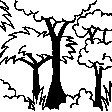
森林/林地
(半天然)天然森林/林地:
- 选伐
植树造林:
- 单一栽培的本地品种
产品和服务:
- 木材
- 薪材
- 水果和坚果
- 其它森林产品
- 放牧/啃牧
- 自然保持/保护
- 娱乐/旅游
- 自然灾害防护
- wind mill parc, hunting
注释:
Major land use problems (compiler’s opinion): In Spain the prevalent dense shrublands (dominated by seeder species), which resulted from agricultural land abandonment and fire occurrence, contain a high fire risk because of both the high fuel loads and their continuity. Resprouter species have been removed in the past and are therefore scarce, whereas seeder species are abundant and increase the risk of fires.
Selective felling of (semi-) natural forests: As a management practice. The forest should be cut more frequently since there is a huge amount of fuel but there is no money for management.
Plantation forestry: Almost the whole forest in this region was planted. Furthermore, they also planted different species as a management practice.
3.3 有关土地利用的更多信息
每年的生长季节数:
- 1
3.4 该技术所属的SLM组
- 天然和半天然森林管理
- 森林种植管理
3.5 技术传播
具体说明该技术的分布:
- 均匀地分布在一个区域
如果该技术均匀地分布在一个区域上,请注明覆盖的大致区域。:
- < 0.1 平方千米(10 公顷)
注释:
Total area covered by the SLM Technology is 0.015 m2.
The experiment was done in three different gorseland test sites with similar history of land use, vegetation composition and structure, and soil characteristics – Morera, Roñoso, Gachas. In each site, there were 4 plots (control, clearing, planting, clearing and planting). Each site has an area of approximately 5000 m2 (total area: 5000 x 3 = 15’000 m2)
3.6 包含该技术的可持续土地管理措施

植物措施
- V1:乔木和灌木覆盖层
- V3:植被的清理
- V5:其它
注释:
Specification of other vegetative measures: Introduction of fire resistant species
Type of vegetative measures: aligned: -linear
3.7 该技术强调的主要土地退化类型
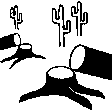
生物性退化
- Bf:火灾的有害影响
- Bs:质量和物种组成/多样性的下降
注释:
Main causes of degradation: deforestation / removal of natural vegetation (incl. forest fires) (Deforestation in the past (removal of resprouter species), land abandonment, uncontrolled growth of fire prone vegetation, afforestations, forest fires), other human induced causes (specify) (change of vegetation composition to fire-prone shrubland), population pressure (Vast areas were deforested in the past for agriculture, important key species were removed. After land abandonment there was a lack of management strategies.), poverty / wealth (The current economic crisis in Spain leads to a lack of investment in forest management, therefore only a minor part of forests is managed), labour availability (In the past there was outmigration from the region to the big cities and therefore there was a lack of management)
Secondary causes of degradation: change of seasonal rainfall (More variability in precipitation leads to a higher risk of fires), droughts (more fires during droughts), land tenure (The state is only allowed to apply management practices in public forest. The private forest is often not managed which increases the risk of fires and the resulting degradation), inputs and infrastructure: (roads, markets, distribution of water points, other, …) (There were big fires in the past because of the lack of fire extinction media like water ponds, streets, transport media (this has been improved now)), education, access to knowledge and support services (Loss of knowledge, important for today’s fires: People (especially from the cities) are not aware anymore of the risk of fire. In the past people lived with the risk and knew how to prevent fires.), governance / institutional (Law to induce implementation of conservation interventions (ley forestal 3/1993). Before this law was implemented there were less conservation practices and therefore a higher fire risk)
3.8 防止、减少或恢复土地退化
具体数量名该技术与土地退化有关的目标:
- 防止土地退化
- 减少土地退化
4. 技术规范、实施活动、投入和成本
4.1 该技术的技术图纸
4.2 技术规范/技术图纸说明
On the left, the situation before management is illustrated. Dense shrublands contain a high fire risk due to their high fuel amount and continuity. On the right, the situation after management is shown. The combination of selective clearing of fire-prone seeder species and planting of more fire resistant resprouter species (illustrated by tree shelters in the drawing) promotes shrubland resilience to fires.
Location: Ayora. Valencia, Spain
Date: 13-12-2013
Technical knowledge required for field staff / advisors: high (The experiment was carried out by scientists (biologists) with a high technical knowledge.)
Technical knowledge required for land users: low (In case of upscaling this experiment to a local or regional level, the work could be carried out by land users with a low technical knowledge, with technical support of scientists and forest agents)
Main technical functions: control of fires, reduction of dry material (fuel for wildfires), Promotion of vegetation species and varieties (more fire resistant vegetation composition)
Secondary technical functions: control of raindrop splash, increase in nutrient availability (supply, recycling,…), increase / maintain water stored in soil
Aligned: -linear
Vegetative material: T : trees / shrubs
Number of plants per (ha): 1000
Vertical interval between rows / strips / blocks (m): <2m
Spacing between rows / strips / blocks (m): <2m
Vertical interval within rows / strips / blocks (m): <2m
Width within rows / strips / blocks (m): <2m
Vegetative measure: Selective vegetation clearing
Vegetative material: T : trees / shrubs
Trees/ shrubs species: Planted species: Pistacia lentiscus, Quercus ilex and Rhamnus alaternus.
Other species: Removed species: Ulex parviflorus, Rosmarinus officinalis, Cistus albidus
4.3 有关投入和成本计算的一般信息
其它/国家货币(具体说明):
Euro
注明美元与当地货币的汇率(如相关):1美元=:
0.74
注明雇用劳工的每日平均工资成本:
47.00
4.4 技术建立活动
| 活动 | 措施类型 | 时间 | |
|---|---|---|---|
| 1. | Cutting and chipping (in-situ) trees and shrubs (removed species: ulex parviflorus, rosmarinus officinalis, cistus albidus. Natural regenerated species which are not cleared: pinus halepensis, pinus pinaster, quercus ilex, juniperus oxycedrus) | 植物性的 | autumn/winter (when the vegetation activity is slowed down) |
| 2. | Planting (planted species: pistacia lentiscus, quercus ilex, rhamnus alaternus) | 植物性的 | autumn/winter (february 2003) |
4.5 技术建立所需要的费用和投入
| 对投入进行具体说明 | 单位 | 数量 | 单位成本 | 每项投入的总成本 | 土地使用者承担的成本% | |
|---|---|---|---|---|---|---|
| 设备 | machine use | ha | 1.0 | 3089.0 | 3089.0 | |
| 设备 | tree shelters | ha | 1.0 | 945.0 | 945.0 | |
| 植物材料 | seedlings | ha | 1.0 | 4587.0 | 4587.0 | |
| 技术建立所需总成本 | 8621.0 | |||||
注释:
Duration of establishment phase: 0.5 month(s)
4.6 维护/经常性活动
| 活动 | 措施类型 | 时间/频率 | |
|---|---|---|---|
| 1. | There is no maintenance, but in case of maintenance they would do selective clearings (using machines) | 植物性的 | all 5-7 years in autumn/winter |
4.7 维护/经常性活动所需要的费用和投入(每年)
| 对投入进行具体说明 | 单位 | 数量 | 单位成本 | 每项投入的总成本 | 土地使用者承担的成本% | |
|---|---|---|---|---|---|---|
| 设备 | machine use | ha | 1.0 | 446.0 | 446.0 | |
| 技术维护所需总成本 | 446.0 | |||||
注释:
The costs were calculated for the application of the technology (combination of clearing and planting) on one hectare. The costs can vary depending on the amount of vegetation which has to be cleared (site specific). The costs of the clearing amount to 1090 Euro per ha (1470 Dollar). The costs of the plantation (both labour and machines) are approximately 5300 Euro per hectare (7150 Dollar). But it should also be noted that the application of the selective clearing and planting on a vast continuous area is not the aim of this technology, but rather to apply the treatments on some selected spots to reduce the continuity of fire-prone seeder species and to increase the probability of dispersal of resprouter species (e.g. by birds). Therefore the costs would be lower than indicated here.
The currency rate (Euro-Dollar) was calculated on November 16th, 2013.
4.8 影响成本的最重要因素
描述影响成本的最决定性因素:
Slope (if the slope is steep, the work is much more difficult and takes more time), distance from a street (people can work less in a day if they have to walk far to clear/plant), vegetation density (it takes more time to clear a densely vegetated area).
5. 自然和人文环境
5.1 气候
年降雨量
- < 250毫米
- 251-500毫米
- 501-750毫米
- 751-1,000毫米
- 1,001-1,500毫米
- 1,501-2,000毫米
- 2,001-3,000毫米
- 3,001-4,000毫米
- > 4,000毫米
农业气候带
- 半湿润
Thermal climate class: temperate
5.2 地形
平均坡度:
- 水平(0-2%)
- 缓降(3-5%)
- 平缓(6-10%)
- 滚坡(11-15%)
- 崎岖(16-30%)
- 陡峭(31-60%)
- 非常陡峭(>60%)
地形:
- 高原/平原
- 山脊
- 山坡
- 山地斜坡
- 麓坡
- 谷底
垂直分布带:
- 0-100 m a.s.l.
- 101-500 m a.s.l.
- 501-1,000 m a.s.l.
- 1,001-1,500 m a.s.l.
- 1,501-2,000 m a.s.l.
- 2,001-2,500 m a.s.l.
- 2,501-3,000 m a.s.l.
- 3,001-4,000 m a.s.l.
- > 4,000 m a.s.l.
5.3 土壤
平均土层深度:
- 非常浅(0-20厘米)
- 浅(21-50厘米)
- 中等深度(51-80厘米)
- 深(81-120厘米)
- 非常深(> 120厘米)
土壤质地(表土):
- 细粒/重质(粘土)
表土有机质:
- 中(1-3%)
5.4 水资源可用性和质量
地下水位表:
5-50米
地表水的可用性:
匮乏/没有
水质(未处理):
良好饮用水
5.5 生物多样性
物种多样性:
- 中等
5.6 应用该技术的土地使用者的特征
生产系统的市场定位:
- 混合(生计/商业
个人或集体:
- 员工(公司、政府)
性别:
- 男人
说明土地使用者的其他有关特征:
Difference in the involvement of women and men: The experiment was done by biologists, all of them were men.
Population density: < 10 persons/km2
Annual population growth: negative
5.8 土地所有权、土地使用权和水使用权
土地所有权:
- 州
- 个人,有命名
土地使用权:
- 个人
- public/open access but organised (e.g. wood, hunting)
- public/open access but organised (e.g. wood, hunting)
注释:
There is some public land, controlled by the state. But there is also some private land. The access to the public land is open but organized. Permission is needed from the government to cut trees, to build a house or to hunt. There are some private hunting areas for which the hunting association has to pay a fee.
6. 影响和结论性说明
6.1 该技术的现场影响
社会经济效应
生产
饲料生产
注释/具体说明:
More grasses for animals (game and livestock) in the cleared areas
饲料质量
注释/具体说明:
Animals (especially goats) eat everything but they like more young grasses than shrubs
畜牧生产
注释/具体说明:
Game/wildlife and livestock are better because there is an increase in fodder quantity and quality
木材生产
注释/具体说明:
Production increases because there is less competition between species and more species planted. The wood/timber generated by the clearing can be used for biomass, fertilizers, pellets, firewood. A part of the wood is chipped in-situ and applied as mulch
能源生产
注释/具体说明:
Bioenergy (biomass)
收入和成本
农业投入费用
注释/具体说明:
Less damage on the cultivated fields because the wild animals do not destroy the fields anymore and stay in the forest (because there is more grass available due to clearings).
社会文化影响
文化机会
注释/具体说明:
People appreciate the visual impact of a cleared forest with a high species richness. It has a high aesthetic value and offers recreational opportunities. Since the planted species are more fire-resistant this value can be sustained.
娱乐机会
注释/具体说明:
People appreciate the visual impact of a cleared forest with a high species richness. It has a high aesthetic value and offers recreational opportunities. Since the planted species are more fire-resistant this value can be sustained.
SLM/土地退化知识
注释/具体说明:
Local people know about the importance of conservation of the area and really like to have the forest protected of wildfires. They will learn about the relationship of planting later-successional species and the reduction of the fire hazard.
冲突缓解
注释/具体说明:
Less fires result in a decrease of the destroyed area, less money will have to be invested in restoration or fire extinction. Farmers, hunters,honey producers will experience fewer losses. Wild animals remain in the forest (more grasses after clearing).
社会经济弱势群体的情况
注释/具体说明:
The clearing and planting could create more job opportunities for unemployed people. This is especially important during the current economic crisis.
生态影响
水循环/径流
蒸发
注释/具体说明:
Due to the mulch layer more moisture is stored in the soil and less water is lost by evaporation (the soil is covered).
土壤
土壤水分
注释/具体说明:
More soil moisture because of less dense shrubland and mulch cover after clearing
土壤覆盖层
注释/具体说明:
Mulch layer
土壤流失
注释/具体说明:
Less erosion because the soil is protected by a mulch layer.
土壤结壳/密封
注释/具体说明:
Mulch layer protects the soil from crusting.
养分循环/补给
土壤有机物/地下C
生物多样性:植被、动物
生物量/地上C
植物多样性
注释/具体说明:
Reintroduction of native species which disappeared due to removal by humans in the past.
动物多样性
注释/具体说明:
There might be more animals because of the fodder supply. Further, different species (e.g. birds) might be attracted by the reintroduced plant species.
害虫/疾病控制
注释/具体说明:
Mono-plantations are bad for the propagation of a pest. After clearing there is a decrease in competition, plants are in healthier conditions,less prone to diseases.Weak plants are eliminated which reduces the risk of pests (always weak plants affected).
减少气候和灾害风险
碳和温室气体的排放
注释/具体说明:
Carbon sequestration, and less fires because the fire-prone shrubs are removed and more fire-resistant trees and shrubs are prevalent
火灾风险
注释/具体说明:
The fire risk is reduced in the long term because by clearing fire-prone and planting more fire-resistant species the vegetation is redirected towards later successional stages (ecosystem more resilient against fires).
风速
其它生态影响
germination of competing seeds
soil surface temperature
注释/具体说明:
Mulch layer
6.3 技术对渐变气候以及与气候相关的极端情况/灾害的暴露和敏感性(土地使用者认为的极端情况/灾害)
渐变气候
渐变气候
| 季节 | 气候变化/极端天气的类型 | 该技术是如何应对的? | |
|---|---|---|---|
| 年温度 | 增加 | 不好 |
气候有关的极端情况(灾害)
气象灾害
| 该技术是如何应对的? | |
|---|---|
| 局地暴雨 | 好 |
| 局地风暴 | 好 |
气候灾害
| 该技术是如何应对的? | |
|---|---|
| 干旱 | 好 |
水文灾害
| 该技术是如何应对的? | |
|---|---|
| 比较和缓的(河道)洪水 | 好 |
其他气候相关的后果
其他气候相关的后果
| 该技术是如何应对的? | |
|---|---|
| temperature decrease, snow, frost | 不好 |
6.4 成本效益分析
技术收益与技术建立成本相比如何(从土地使用者的角度看)?
短期回报:
轻度消极
长期回报:
非常积极
技术收益与技术维护成本/经常性成本相比如何(从土地使用者的角度看)?
短期回报:
非常积极
长期回报:
非常积极
注释:
Short term returns are slightly negative because the management practice is expensive and until the trees reach a mature state, there are not many returns (in terms of wood and biomass). In the long term this management practice has very positive results because it increases the resilience to fires and can be seen as a sustainable management of fire-prone areas. Additionally, wood and biomass can be extracted. The idea is not to apply any maintenance in the first 10 years after the establishment.
6.5 技术采用
注释:
There is no adoption trend since this was only an experiment, but maybe there will be the possibility to upscale this technology in a regional project.
6.7 该技术的优点/长处/机会
| 土地使用者眼中的长处/优势/机会 |
|---|
| Almost all villagers prefer a managed forest. It has a high aesthetic and recreational value. Through the application of this technology the awareness of the risk of wildfires would probably increase. |
| Shepherds and farmers benefit from forest clearings. There are more young grasses in the forest which provides fodder for livestock. Also wild animals benefit from this food supply which in turn hinders them to destroy cultivated fields of the farmers. |
| 编制者或其他关键资源人员认为的长处/优势/机会 |
|---|
|
After fires, the natural landscape regenerated with a high and continuous fuel amount and a scarce occurrence of native resprouter species. It is crucial to apply management actions to reduce the fire hazard. The experiment demonstrated that it is possible to accelerate the post-fire vegetation response (which promotes ecosystem resilience). |
| Planting of resprouting species in post-fire areas can accelerate the natural process. Clearing of the vegetation reduces the fire risk, but this treatment may also enhance seedling establishment and growth. |
| The slash and brush chips generated by the clearings can be reused in the planting holes. This mulch layer protects the soil surface and reduces both the soil surface temperature and the germination of competing seeds while increasing the soil moisture content, especially in the driest periods. |
|
The combination of clearing and planting resprouting species seems to be an appropriate option for managing these areas because, once established, the resprouting species persist for a long time and lead to an increase of the ecosystem resilience. |
| Social and economic benefits for the locals. Especially during the economic crisis the forest management is an important source for jobs. |
6.8 技术的弱点/缺点/风险及其克服方法
| 编制者或其他关键资源人员认为的弱点/缺点/风险 | 如何克服它们? |
|---|---|
| The management activities are expensive and labour-intensive. The state does not invest much money in prevention of forest fires but focuses more on fire extinction. | More investment in prevention of forest fires is required and this management practice could increase the ecosystem resilience against fires in the long term in a sustainable way. This would also generate jobs. This technology implies a combination of techniques (selective clearing and planting). Costs may be reduced by implementing individual techniques but positive results may also be reduced. |
| The technology could result in a reduction of the animal production because grazing should be restricted after planting to ensure the growth of the planted seedlings. | Since the technology would not be applied over vast areas but only locally on some plots, the fodder supply would probably still cover the needs of the animals. |
| Depending on the site, some soil may be exposed to erosion due to mechanical clearing. | Mulching with brush chipping can minimize or even solve this problem. |
| After clearing, an increase in wind velocity might occur. | The planted trees will grow which will again result in the reduction of this problem. |
7. 参考和链接
7.1 信息的方法/来源
- 实地考察、实地调查
- 与SLM专业人员/专家的访谈
7.2 参考可用出版物
标题、作者、年份、ISBN:
Valdecantos, A., Baeza, M.J., Vallejo, V.R. (2009): Vegetation management for promoting ecosystem resilience in fire-prone Mediterranean shrublands. Restoration Ecology 17, 3: 414-421.
链接和模块
全部展开 全部收起链接
无链接
模块
无模块


